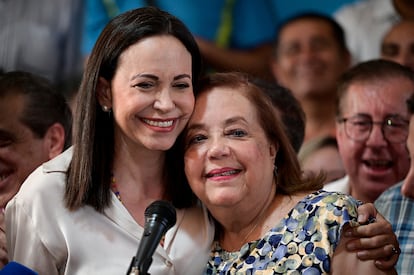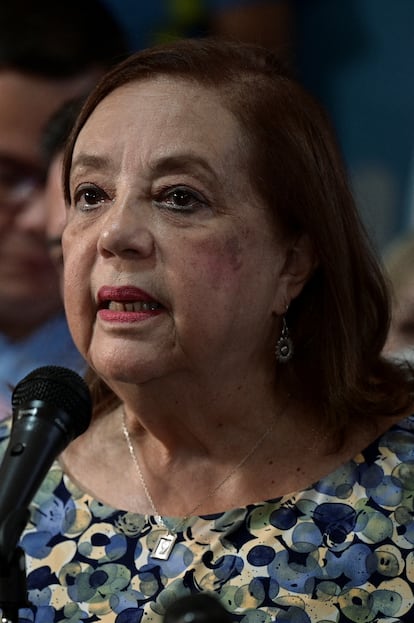Corina Yoris, the renowned 80-year-old academic who will face Nicolás Maduro at the polls
After arduous negotiations and much secrecy, the opposition chooses an activist of merit, civic commitment and free of controversy to replace María Corina Machado

An academic with professional credentials, unknown in the political debate, devoid of legends and with a sufficient dose of institutional and democratic commitment. With the designation of Corina Yoris as the alternative candidate to María Corina Machado, disqualified by the Chavista regime, the various factions of the Venezuelan opposition seem to have found the desired point of consensus to give continuity to this year’s electoral initiative, without losing the political mandate of the primary election of last October 22.
Yoris, who was part of the group of civil society personalities that formed part of the opposition’s National Primary Commission in which Machado won with more than 90% of the votes last October 22, joined the Venezuelan Academy of Language a few days ago.
The appointment of Yoris as an alternative candidate produced an initial surprise in the public, after hours of conjectures and inquiries, due to the fact that she is a person little known among the population. Gradually, however, a feeling of optimism and satisfaction spread among many voices of the Venezuelan opposition upon hearing the news.
Little or nothing has been said about her inexperience in the political field: such circumstance, surrounded by Machado’s command and the national volunteer team, is valued rather as a guarantee among observers and politicians. Born in Caracas, Corina Yoris Villasana (1944) has a degree in Philosophy and Literature and a PhD in History from the Universidad Católica Andrés Bello, institution where she also received the distinction Orden UCAB, and the award for Philosophical Research Federico Riu. She has also been a professor at the Universidad Metropolitana.

She has been a professor of Logic and Theory of Argumentation at the University of Salamanca, Spain, and holds a master’s degree in Latin American Literature from the Universidad Simón Bolívar, Caracas. A full-time professor, she has been president of the Venezuelan Society of Philosophy and a member of the Board of Directors of the Inter-American Network and the Ibero-American Society of Philosophy. Yoris has also done visible academic work in Mexico in the field of logic and philosophy of science, and is a member of the International Etienne Gibson Society.
The academic and professional merits of Yoris were pondered by María Corina Machado herself, who at all times wanted to offer the public opinion, with her at her side, a solution of continuity with respect to her own effort: “We have found a person of my total confidence, honorable, who emerged from the bosom of the Democratic Unitary Platform. Everyone knows that my fight is not over”.
Then, to offer everyone the certainty that she continues to lead the campaign process, she added: “The law establishes that up to 10 days before the election there can be a substitution of a candidate. So here we are going to fight until the last day”. The name of Yoris, which has unleashed a contained euphoria in certain sectors of the opposition, must be accompanied, according to some related sources, by other possible voluntary candidates, so that they may be inscribed in the list of aspirants and occupy her vacancy in case the National Electoral Council (CNE) fabricates another argument to inhibit her nomination.
The hermeticism, on this and other issues, in the entourage of the campaign committee of María Corina Machado, however, is completely impenetrable. In the informative and political environment of the country, there is speculation about other names, but, between the legal harassment of the Chavista Government, the lack of trust and conflicting interests in the opposition, and the reluctance to confuse the population with unconfirmed hypotheses, it has been impossible to identify them.
Another name that has been mentioned is Teresa Albanes, an academic with extensive experience in civil engagement in recent years, president of the Electoral Commission of the Democratic Unity Table in its primary elections against Chavism in 2011. Upon accepting the delicate political assignment, Yoris commented: “Venezuela is heading towards a transition path and we have to walk it together. We are all needed at this moment. God put us women to give birth. We are giving birth to the country, but we need the support of the hand of man [...]. It is all of us, it is Venezuela, that Venezuela that wants to recover its freedom and dignity.”
Sign up for our weekly newsletter to get more English-language news coverage from EL PAÍS USA Edition
Tu suscripción se está usando en otro dispositivo
¿Quieres añadir otro usuario a tu suscripción?
Si continúas leyendo en este dispositivo, no se podrá leer en el otro.
FlechaTu suscripción se está usando en otro dispositivo y solo puedes acceder a EL PAÍS desde un dispositivo a la vez.
Si quieres compartir tu cuenta, cambia tu suscripción a la modalidad Premium, así podrás añadir otro usuario. Cada uno accederá con su propia cuenta de email, lo que os permitirá personalizar vuestra experiencia en EL PAÍS.
¿Tienes una suscripción de empresa? Accede aquí para contratar más cuentas.
En el caso de no saber quién está usando tu cuenta, te recomendamos cambiar tu contraseña aquí.
Si decides continuar compartiendo tu cuenta, este mensaje se mostrará en tu dispositivo y en el de la otra persona que está usando tu cuenta de forma indefinida, afectando a tu experiencia de lectura. Puedes consultar aquí los términos y condiciones de la suscripción digital.








































